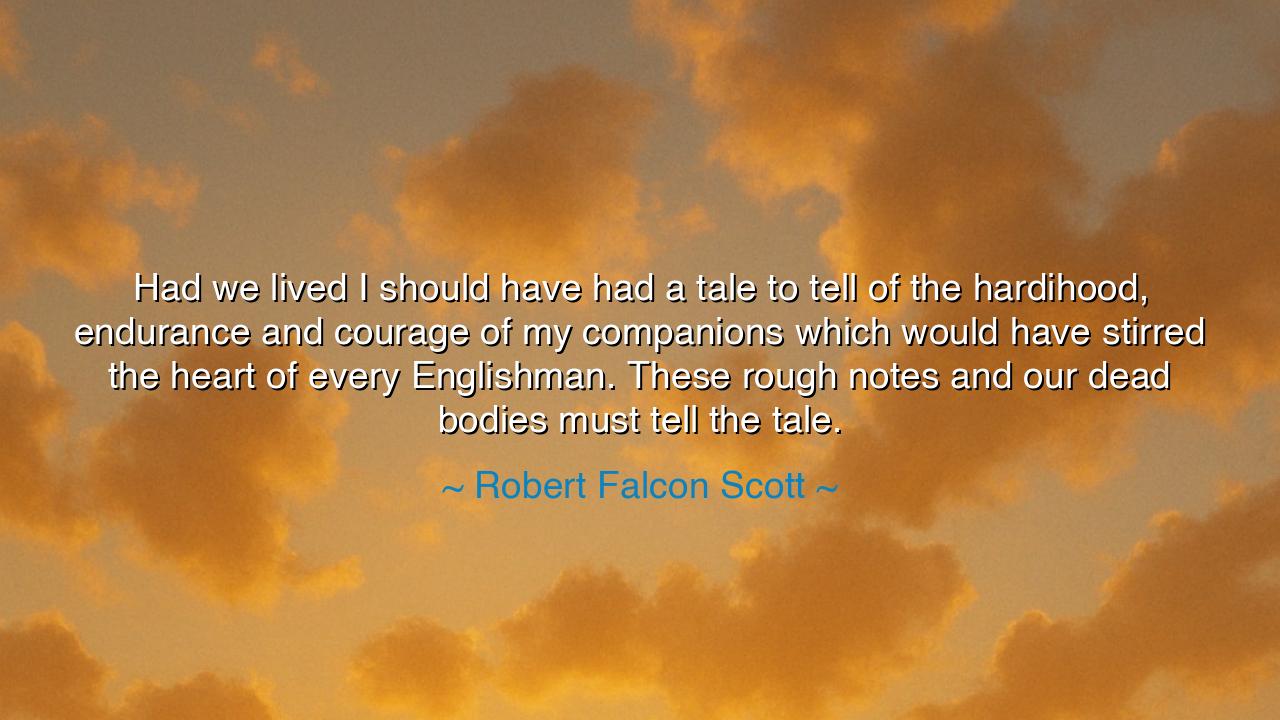
Had we lived I should have had a tale to tell of the hardihood
Had we lived I should have had a tale to tell of the hardihood, endurance and courage of my companions which would have stirred the heart of every Englishman. These rough notes and our dead bodies must tell the tale.






The words of Robert Falcon Scott, written as death closed its icy hand around him and his companions in the Antarctic wilderness, echo through time like a hymn to human endurance: “Had we lived I should have had a tale to tell of the hardihood, endurance and courage of my companions which would have stirred the heart of every Englishman. These rough notes and our dead bodies must tell the tale.” In this haunting farewell, Scott bequeathed to the world not merely an account of a doomed expedition, but a testament to the spirit of perseverance, the nobility of sacrifice, and the eternal dignity of human courage in the face of nature’s unconquerable power.
This quote was written in March 1912, as Scott and his men lay dying in their tent, frozen and exhausted after failing to return from the South Pole. They had marched through storms of unimaginable fury, their bodies wasting under hunger and frostbite, their hopes dimming day by day. Yet even as death encircled them, Scott’s final thoughts were not of regret or bitterness, but of honor, of the courage of his comrades, and of the story that must live on when they could not. His words reveal the heart of a man who, though defeated by the elements, refused to let his spirit be vanquished. The body may perish, but courage endures.
There is in these lines a holiness of purpose — the understanding that the worth of life lies not in survival alone, but in the manner of one’s struggle. The “hardihood” Scott praised is not the arrogance of conquest, but the quiet, patient strength of those who keep walking even when the light fades. The “endurance” he honored is not blind stubbornness, but devotion to duty — to one’s companions, one’s mission, and one’s ideals. And the “courage” he revered is the courage to face the inevitable, to look death in the eye without surrendering dignity or hope. In this, Scott and his men joined the company of heroes whose greatness was forged in suffering, not triumph.
History is filled with such figures — men and women who, though defeated in the flesh, triumphed in the spirit. Leonidas at Thermopylae, who faced annihilation for the sake of his people’s freedom. Joan of Arc, who walked through fire to fulfill a divine vision. Ernest Shackleton, another Antarctic explorer, who years later saved his entire crew from the same frozen abyss by willpower alone. Each of them, like Scott, reminds us that true victory is not in reaching the end, but in refusing to yield along the way. The measure of a soul is found in how it faces despair.
Scott’s dying words also speak of legacy. He knew that his voice would not reach the world in life — that his “rough notes” would be all that remained. Yet even so, he wrote them with love, with reverence for his comrades, and with faith that their story would “stir the heart of every Englishman.” Indeed, it stirred not only England, but all of humanity. His journal, found beside his frozen body, became one of the great documents of courage. Through it, the world saw that even in death, the human spirit could write its own immortality.
The lesson of Scott’s words is not that we should seek suffering, but that when fate leads us into darkness, we must meet it with grace and resolve. Life will not always grant victory; often, it will demand endurance. Yet it is in enduring — with loyalty, faith, and courage — that we carve meaning from the void. When all comfort falls away, what remains is the truth of who we are. Scott’s “dead bodies” did not mark defeat; they became monuments of perseverance, proof that there is a form of greatness untouched by success or failure.
So, my child, when life’s storms rise against you — when you find yourself in your own frozen wilderness — remember the lesson of Captain Scott. Do not measure your worth by the distance you reach, but by the strength with which you travel. Stand by your companions. Record your truth. Let your courage tell the tale when words cannot. For in the end, every noble act, every quiet endurance, every steadfast heart leaves behind its own “rough notes” — and through them, the light of the human spirit continues to warm a cold and distant world.






AAdministratorAdministrator
Welcome, honored guests. Please leave a comment, we will respond soon